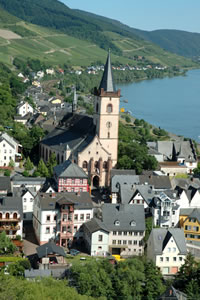De Britse schrijver Evelyn Waugh werd geboren in Londen op 28 oktober 1903. Zie ook mijn blog van 28 oktober 2006 en ook mijn blog van 28 oktober 2007 en ook mijn blog van 28 oktober 2008 en ook mijn blog van 28 oktober 2009.
Uit: Brideshead Revisited
“Isn’t it early?” said Sebastian. “The women are still doing whatever women do to themselves before they come downstairs. Sloth has undone them. We’re away. God bless Hardcastle.”
“Whoever he may be.”
“He thought he was coming with us. Sloth undid him too. Well, I did tell him ten. He’s a very gloomy man in my college. He leads a double life. At least I assume he does. He couldn’t go on being Hardcastle, day and night, always, could he? Or he’d die of it. He says he knows my father, which is impossible.”
“Why?”
“No one knows Papa. He’s a social leper. Hadn’t you heard?”
“It’s a pity neither of us can sing,” I said.
At Swindon we turned off the main road and, as the sun mounted high, we were among dry-stone walls and ashlar houses. It was about eleven when Sebastian, without warning, turned the car into a cart track and stopped. It was hot enough now to make us seek the shade. On a sheep-cropped knoll under a clump of elms we ate the strawberries and drank the wine – as Sebastian promised, they were delicious together – and we lit fat, Turkish cigarettes and lay on our backs, Sebastian’s eyes on the leaves above him, mine on his profile, while the blue-grey smoke rose, untroubled by any wind, to the blue-green shadows of foliage, and the sweet scent of the tobacco merged with the sweet summer scents around us and the fumes of the sweet, golden wine seemed to lift us a finger’s breadth above the turf and hold us suspended.
“Just the place to bury a crock of gold,” said Sebastian. “I should like to bury something precious in every place where I’ve been happy and then, when I was old and ugly and miserable, I could come back and dig it up and remember.”

Jeremy Irons en Anthony Andrews als Charles en Sebastian
In de tv-serie Brideshead Revisited uit 1981
This was my third term since matriculation, but I date my Oxford life from my first meeting with Sebastian, which had happened, by chance, in the middle of the term before. We were in different colleges and came from different schools; I might well have spent my three or four years in the University and never have met him, but for the chance of his getting drunk one evening in my college and of my having ground-floor rooms in the front quadrangle.
I had been warned against the dangers of these rooms by my cousin Jasper, who alone, when I first came up, thought me a suitable subject for detailed guidance. My father offered me none. Then, as always, he eschewed serious conversation with me. It was not until I was within a fortnight of going up that he mentioned the subject at all; then he said, shyly and rather slyly: “I’ve been talking about you. I met your future Warden at the Athenæum. I wanted to talk about Etruscan notions of immortality; he wanted to talk about extension lectures for the working-class; so we compromised and talked about you. I asked him what your allowance should be. He said, ‘Three hundred a year; on no account give him more; that’s all most men have.’ I thought that a deplorable answer. I had more than most men when I was up, and my recollection is that nowhere else in the world and at no other time, do a few hundred pounds, one way or the other, make so much difference to one’s importance and popularity. I toyed with the idea of giving you six hundred,” said my father, snuffling a little, as he did when he was amused, “but I reflected that, should the Warden come to hear of it, it might sound deliberately impolite. So I shall give you five hundred and fifty.”

Evelyn Waugh (28 oktober 1903 – 10 april 1966)
De Vlaamse schrijver JMH Berckmans (Jean-Marie Henri) werd geboren in Leopoldsburg op 28 oktober 1953. Zie ook mijn blog van 28 oktober 2008 en ook mijn blog van 28 oktober 2009.
Uit: De wortel in de brievenbus
„Je weet niet wat het is. Nog steeds niet. Na al het dolen en al het dwalen. Door die miljoenen straten van die duizenden steden. Overal ter wereld. Na al het schorremorrie waaraan je overbodige porties van je weinige nog resterende vrienschap hebt geschonken en die je allemaal verraden hebben, de ene na de andere, sommigen overdag, de meesten ’s nachts. Wellicht zal je ’t ook nooit weten. Ik zeg wellicht. Waarschijnlijk. Misschien. Eventueel. Mogelijkerwijs. Bijwoorden van, van wat eigenlijk, bijwoorden van twijfel en wanhoop. Bijwoorden van radeloosheid. Van kommer en kwel, tot je er krom en knoestig bijloopt en de lui in de straten zeggen kijk daar heb je die sukkelaar weer. Die met z’n beige anorak en z’n vettige jeans. Laat ze maar zeggen. Het zijn de lui in de straten maar. Het zijn Willy en Jeanine en Leo en Sylvia maar. En die zeggen zoveel. Die zeggen dat de zon schijnt of dat het regent. Terwijl het gewoon maar sneeuwt of de apocalyps is losgebarsten en het einde van de tijd nabij is. Dat we moeten verschijnen voor de Alwijze en Hij over ons zal oordelen. Dat sommigen aan z’n rechter en sommige anderen aan z’n linkerhand zullen zitten. Die zeggen dat binnenkort de regering valt, of op z’n minst door de Wetstraat gaat strompelen. Ze weten alles van alles en ze kennen iedereen. Dat helpt. Ze hoeven nooit nog met iemand kennis te maken. Nooit nog iemand de hand te drukken.
Misschien dat het je ooit in een flits te binnen schiet, terwijl je ergens straalbezopen in een goot ligt, op de voorlaatste bank van de bus naar het stempellokaal zit te twijfelen aan jezelf, aan de zin van je daden, aan de geldigheid van je roserode stempel straks, terwijl je ergens staat te pissen in een pissijn, in het holst van de nacht in een gore kroeg. Allicht Jean-Jaques.“

JMH Berckmans (28 oktober 1953 – 31 augustus 2008)
De Duitse schrijver Uwe Tellkamp werd geboren op 28 oktober 1968 in Dresden.Zie ook mijn blog van 14 oktober 2008 en ook ook mijn blog van 28 oktober 2008 en ook mijn blog van 28 oktober 2009.
Uit: The Tower (Vertaald door Rebecca K. Morrison)
“Ridged like a karst landscape, like the debris of jagged piled up ice floes, the island of coal stretched out in front of the four visitors; three of them showed their passes at the bridge control, then, when Richard had lowered little Philip from his shoulders and slipped his hand into Regine’s, they made their way over the ‘Copper Sister’ to the offices beyond. The mist hung low over Ostrom, dampening the whistle of ‘Black Mathilda’ as she signalled her arrival through the tunnel at the heating works. The snow on the bridge had been trodden flat by numerous shoes, even at this early morning hour; it was the first Tuesday of the month – administration day. Meno shielded his eyes, the whiteness was dazzling, and he noted the first sharp shafts of the March sun striking off the heavily sloping, frost-encrusted roofs of the buildings, their frozen windows now clear as water, now a concentric whirl, like the splintering drops of dew caught in a spider’s web, igniting sparks, flaring into a sudden confusion of light and a multi-faceted prismatic display that was echoed countless times in the broken axels of the buildings’ depths: it found its counterpart in the compressed slabs of quartz, the ridges, the needles of ice.
They had arrived before the doors opened and joined the queue that stretched from the colonnaded entrance as far as the Marx and Engels monument area in the centre of the courtyard; cleared of snow, its grey concrete swept clean, the space could hardly be bridged by a human voice. Marx and Engels were holding books of bronze which they appeared to be reading; crows settled on their heads and the sentry on duty, not permitted to budge, tried to shoo them away with regular clicks of his tongue. Some of those waiting looked on with pity and raised their hands ready to clap, only to be discouraged by acquaintances less benevolently inclined, their gaze fixed on the colonnaded entrance. Richard gave up counting at ‘one hundred’, opened his bag, reassured himself that the report was still there (but who could have taken it – he had packed the bag himself and checked before leaving); Meno had opened his worn briefcase, too, and was rummaging through papers.”

Uwe Tellkamp (Dresden, 28 oktober 1968)
De Amerikaanse dichter en criticus John Hollander werd geboren op 28 oktober 1929 in New York. Zie ook mijn blog van 28 oktober 2009.
The Lady of the Castle
Venus Pudica stands, bent. Where her hand is
Cupping her marble mound a mystery has
Come into being as the sculptor hides what
Stone could not show yet,
Nor bronze expound. The goddess may be guarding
Herself, or in a special mode of pointing
Out (should we call it “curving in” ?) her temple,
Teaching her children
The central and precious, where they may be found.
Or indeed, as the girls say, she is hiding
Nothing, nor instructing—she is caressing
That which she barely
Touches, warming those feelings which for her are
Wisdom blossoming even within marble.
What her maker buried she loves, and thereby
We are revealed it.
Far in the minimal North, some contracted
Hand or eye has carved into senseless clunch an
Impudent and schematic presence, done in
Primal intaglio,
A circle head perched on a larger circle
Of lady body, spidery legs drawn up
And outward showing off on the church tower
Under the clock, and
Cut in a sort of Linear C, her slit.
Her hands touch nothing but her knees held open.
It is not she who joys in it, nor teaches;
But from beneath her
A very well-hung personage indeed is
Climbing up toward her, as if far from having
Merely no words for things, their sculptor had no
Method of using
Images for them: no things, only actions.
And thus translated into language her wedge
Would be a “Let’s-get-up-on-her-and-in-there.”
Hieroglyphic
Of nature’s own cuneiform, she sits high
But almost hiding in the irrelevance
Of a religious building now to the young
Mums of the village.
Ignored, then, or misread by mythographers
—Myopically concluding that a corpus
Christi lies beneath a bungled cross—as a
Crude Deposition,
She with her terrible thin cut is not to
Be any the less feared by those who read signs
And remember instances of their wide truths
Narrowed in darkness:
Hers is the closed door into the stone again.
The soft traps having long since sprung, the marble
Self-adoring dolls long crumbled, hers is the
Linear kingdom.

John Hollander (New York, 28 oktober 1929)
De Nederlandstalige dichter en schrijver Al Galidi (eigenlijk Rodhan Al Khalidi) is van Iraakse afkomst. Zijn geboortedatum is onbekend, omdat zulke gegevens niet geregistreerd worden en verjaardagen niet gevierd worden in zijn streek van herkomst, maar valt waarschijnlijk in 1971. Geboren werd hij in Al-Najaf (een klein dorpje in het Zuiden van Irak). Zie ook mijn blog van 28 oktober 2008.
Wandeling door Harlingen
Zonder hond
zonder kat
zonder fiets
loop ik alleen naar zee.
Ik groet een oude man
en zijn hond antwoordt: “Hij is doof.”
Ik loop door
en groet een hond.
Zijn baas antwoordt:
“Hij houdt niet van vreemden.”
Ik blijf lopen en zie een fiets een vrouw leiden.
Ik ren en zie een hond die zijn baas uitlaat.
Ik wandel en zie een hond fietsen.
Ik kijk door een raam, misschien zie ik iemand,
maar ik zie alleen een kat naar me kijken
die roept: “wat een wereld!”
Ik doe mijn ogen dicht en ga verder.
O, wat moeilijk om in Harlingen te wonen
zonder hond
zonder kat
zonder fiets.
Boer
Geen aardappel
probeerde ooit zelfmoord te plegen.
Geen komkommer
zei ooit:
“Ik ben geen komkommer, ik ben een banaan.”
Geen tomaat zal zeggen:
“Ik wil niet in de soep, ik wil in de sla.”
Geen gehandicapte wortels
geen krankzinnige paprika’s
Daarom ben ik boer.

Al Galidi (Al-Najaf, 1971)
De Duitse dichter, schrijver en theoloog Johannes Daniel Falk werd geboren op 28 oktober 1768 in Danzig. Zie ook mijn blog van 28 oktober 2008 en en ook mijn blog van 28 oktober 2009.
Das Ungewitter im Walde
An Heloisen.
Bin ich allein auf dem Planeten
Mit Heloisen Hand in Hand?
Ob Blitze rings den Himmel röthen,
An deinem Busen ist mein Stand.
An diesen Pol will ich mich heften,
Nun rolle Welt! – ich halte dich.
So triff mit allen Himmelskräften,
Komm, Tod! triff Blizt! vernichte mich.
Mein süßes Licht in Lebensnächten,
Mein holder Wunsch, der mich entzückt,
Der darf getrost mit Göttern rechten,
Der Engel an sein Herz gedrückt.
Siehst du der Lilie Schnee am Stengel,
Sie nickt, sie wankt so lieberoth,
Und von den Himmeln steigt ein Engel,
Und küßt in Feuer sie zu Tod.
So will auch ich im Zeitenflusse
Mein Liebstes auf der Welt umfahn,
So faßt mit Heloisens Kusse
Verzehrend Himmelsgluth mich an.
Ertödtend liebliches Vergnügen!
Was fürchtest du von dem Geschwätz
Der Schwalben, die am Wasser fliegen?
Verschwiegenheit ist ihr Gesetz.
Warum erbebt vor Schamerröthen
Dein süß verschüchtertes Gesicht?
Des Himmels Donner kann uns tödten:
Verrathen? nein, das will er nicht!
Komm, reich’ – ein Engel über Sternen
Mir, Heloise, deine Hand:
Der darf, was Himmel ist, nicht lernen,
Der ihn in deinen Armen fand.

Johannes Daniel Falk (28 oktober 1768 – 14 februari 1826)
De Duitse dichter en schrijver Karl Philipp Conz werd geboren op 28 oktober 1762 in Lorch. Zie ook mijn blog van 28 oktober 2008 en en ook mijn blog van 28 oktober 2009.
Trostlied
Und wenn es trüb und unstöt geht,
Des Himmels Wolken sich verdüstern,
Und bangend Weid’ und Esche flüstern,
Vorm Nordwind, der sie rauh umweht;
Zum Himmel doch schaut auf der Glaube,
Mit Augen, gleich der frommen Taube.
Auch ist im Herzen nimmer fern,
Wo Glaube wohnet und Vertrauen,
Des Trostes Samen anzubauen,
Der Liebe milder Hoffnungsstern.
Der selbst die Sonn’ ist und in trüben
Eewölken stralt, muß ewig lieben.
Hast du verschuldet nicht die Roth,
Die dich umdrängt; gelaßner tragen
Kannst du sie leicht, und ihr entschlagen
Wird nach der Prüfung dich der Gott,
Zur Stunde, denn er kennt die rechten,
Der Licht oft schafft aus Mitternächten.
Auch in der Trübsal thut sich kund
Sein Vaterherz, das Herz der Herzen.
Kann Liebe Liebe je verscherzen?
Was ausgesprochen hat sein Mund,
Das sprach er aus für alle Zeiten,
Und Altes kann dir Neues deuten.
Mehr als die Gaben liebe nur
Den Geber immer aller Gaben,
Und mehr am Schöpfer Freude haben
Mußt du denn an der Kreatur;
So bleibt in deines Herzens Nähe
Der hohe Frieden aus der Hohe.

Karl Philipp Conz (28 oktober 1762 – 20 juni 1827)
Lorch
